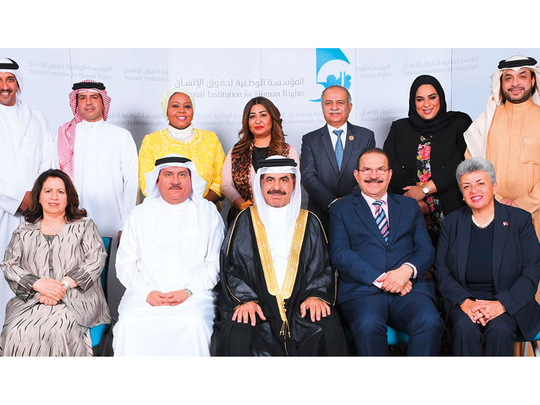
Manama: The appointment of Maria Anton Khouri as the first Bahraini woman to head the National Institution for Human Rights, Bahrain’s main rights society, has been welcomed as a new boost for women in the country.
“It is great because she deserves it, because she is a woman, because she is a Christian and because she is committed to serving people in Bahrain. All these attributes are important because they consolidate Bahrain’s equal opportunities, openness, tolerance and mutual acceptance,” Duaij Darweesh, a veteran photographer who knows her well, said.
But as Bahrain keeps moving forward with its vision for its women, some people in countries with no real visible role for women cannot help wonder “how dependable Bahraini women are as leaders, be it in state institutions or private companies or businesses.”
“Bahraini women have been at the forefront of national and international achievements for decades,” Maysa Al Thawadi said.
“They have proven their aptitudes and their leadership traits on numerous occasions and throughout the years, earning praise and compliments as trailblazers and achievers.”
How does Maysa see the leadership concept?
The expert with more than two decades in high-profile media positions and who was selected among the most influential women in Bahrain 2017 likened the concept of leadership with driving a fast car on the crowded highway that must reach a destination at a specific time.
“Careful realistic planning, commitment to the objective and readiness to deal with all situations smoothly and successfully are required,” she said. “And Bahraini women have repeatedly proven they are ready, fast, well-focused and capable of negotiating challenges and achieving goals.”
In her case, she said that compartmentalised thinking helps make better leaders.
“Professional pressure means that even though there is a limited amount of time and mental energy, a leader has to deal with numerous full-time challenges. A leader finds that the best way is to compartmentalise the issues, to isolate each of them and address it separately for some time until a breakthrough is achieved or at least some incremental progress is accomplished. The leader then moves on to the next issue, always careful not to combine two challenges.”
She said a leader should take one issue at a time and not get too emotionally attached so that she can shut a compartment and move on to the next without great pain.
“This is very important for women because many of them have to shoulder professional and family responsibilities. A French proverb says: ‘If you chase two rabbits at the same time, you will catch neither’. So, when women go for compartmentalised thinking, they can be great leaders.”
The island kingdom has gained an outstanding reputation for elevating the status of women and for empowering them politically, socially and economically through comprehensive programmes and intensive drives.
Last month, Shaikha Rana Bint Isa Bin Duaij Al Khalifa made history by becoming the first undersecretary of the Ministry of Foreign Affairs in Bahrain.
Bahrain has several women who hold high positions as ministers, ambassadors, diplomats, and judges.
Houda Nonoo in 2004 became the first woman and the first Jew to head a human rights society in Bahrain, the Bahrain Human Rights Watch Society.
Houda made more history in 2008 by becoming the first Jew from the Arab world to be appointed ambassador to the US.
An official body, the Supreme Council for Women, was set up soon after the launch of wide reforms by King Hamad Bin Eisa Al Khalifa to help lay strategies and plans to protect the rights of women while advancing their status within institutions and companies.
Led by Princess Sabeeka Bint Ebrahim Al Khalifa, the wife of King Hamad, the council has signed agreements with government entities and instituted awards to boost the conditions of women and activate their roles as partners and leaders in the nation-building process.
Bahrain celebrates Bahraini Women’s Day on December 1 under a different theme every year.












